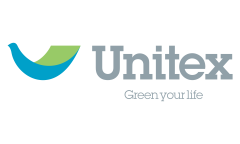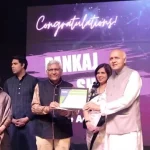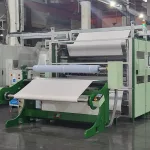Tech to save textile
Textile industry is gaining momentum in Pakistan: the country’s target is to double the volume of textile exports in the coming years. In order to accomplish that, however, one must solve the challenges involving the availability of energy. Wärtsilä’s capabilities in supplying flexible, efficient and sustainable power generation solutions are providing a much-needed boost for the country’s economy.
Textile industry is the heart and soul of Pakistan: it is the largest manufacturing industry and the economic backbone of the country. Pakistan is the 8th largest exporter of textile commodities in Asia, while the textile industry’s contribution to economy is around 8.5% of the total GDP. The textile sector also employs almost half (45%) of the total labour force in the country.
Pakistan decided to loosen pandemic restrictions early, and the nation’s exports have emerged stronger than its South Asian rivals’. Textiles have been the leading export product for Pakistan during the pandemic, too, showing faster recovery in outbound shipments compared to, for example, Bangladesh and India.
Tech transition brings opportunity
During the past year or so, Wärtsilä has gained numerous new power plant orders in Pakistan – many of them related to textile industry. Alexandre Eykerman, Energy Business Director of Wärtsilä Middle East Operations, says that Pakistan is not a new market for Wärtsilä as such, but there are new types of opportunities emerging now.
There is a strong global trend at work here: As textiles ecosystems are becoming more sustainable, innovative and agile to meet consumers’ demands, this is reflected in countries such as Pakistan, too. The local textile industries need to shift power generation from high-speed generating set technology to modern, medium-speed engines with the fuel flexibility capability enabling increased efficiency as well as a shift towards cleaner energy production.
“The possible significance for textile industry is a swing towards a long-term view instead of short-term view that many in this sector have been adopting for years. To reach better sustainability and profitability, the smaller industries have realised the necessity to look at their power generation and find ways to increase their efficiency by switching to medium-speed technology instead of high-speed technology,” Eykerman analyses.
Enabling industry growth
Arif Akram, General Manager, Sales, at Wärtsilä Energy, says that Pakistani textile industry is going for a significant expansion and more power is needed to achieve this transition.
“Customers are moving from high speed to medium speed to have improved efficiency, long-term view, and fuel flexibility – meaning use of gas or alternatively liquid fuel in dual-fuel (DF) engines when gas is not available. Efficiency is important due to the increase in fuel prices,” he says.
Wärtsilä is able to offer a technology which delivers an improved fuel-flexible approach with the highest efficiency.
“Our dual-fuel technology allows the customer to combust three fuels into one engine at a press of a button. It offers the comfort to run the plant independently of the fuel allocation restriction that some of these small industries can face from time to time,” says Alexandre Eykerman.
As DF technology can adapt to any deviation of a norm, this already goes a long way to solving energy challenges in Pakistan.
“If the country faces a shortage of gas, the plant can turn to an alternative fuel on the spot, enabling the textile industries to continue in generating products and revenues. Wärtsilä’s local presence in Pakistan is strong – we have more than 400 engineers in the country to support our customers in textile industry in finding the optimal power generation solution for their every need,” Eykerman sums up.
Power 24/7/365
Arif Akram points out that there is really no shortage of power in Pakistan, but there is, however, shortage of gas during winter season. The national power grid, on the other hand, is not so reliable in some places.
“The customers want to operate their plants 24/7 and for that, they need reliable and efficient power. Solutions offered by Wärtsilä can reach over 80% gross plant efficiency and provide fuel flexibility when gas is not available,” Akram says.
AGI Denim is one of the largest local textile exporters that has come to depend on Wärtsilä’s expertise. In November 2020, AGI Denim ordered 12MW Wärtsilä DF engines (6MW each) to meet the power demand for their upcoming textile factory. The power plant will be commissioned in 2021.
Javed Ahmed, CEO of the company, says that Wärtsilä provides efficient and flexible energy solutions which help the company reduce its operational expenses. Therefore, AGI Denim intends to sign a service agreement with Wärtsilä.
“Reliability is very important and Wärtsilä’s dual-fuel solution provides the reliability needed by our industry. With the Wärtsilä solution, we can reach close to 75% plant efficiency and we don’t need to change the power plant asset after every 60,000 hours as the Wärtsilä solution has a life span close to 30 years,” Ahmed explains.
Naturally, sufficient power to the operations is simply vital as AGI Denim needs to deliver export orders to meet customer timelines. “Delay in meeting customer timelines means losing a customer – which is something no one wants,” Ahmed says.
AGI Denim is already looking ahead into a post-Covid world and making plans accordingly.
“We are expanding our textile business and to meet our power requirements, we have chosen Wärtsilä,” Ahmed says.
Comeback calling?
As long as power issues stay solid, Pakistan’s textile industry is in a much better position than its regional competitors, comments Alexandre Eykerman.
“Due to political push, it has been noticed that world buyers have diverted their orders to Pakistan from China, India and Bangladesh. This is due to different reasons, including US-China trade war and a halt in production in India with worsening of Covid-19 crisis there,” he says.
“With the existing fuel allocation, focus is very often towards large-scale plants, but thanks to our solution, we can offer an alternative which allows the country to address its needs without jeopardising the textile operations. So this is definitely a win-win.”
Akram notes that the textile sector has suffered during the past decade, mostly due to the unstable political and security situation, and a few of the big textile players even moved their operations to Bangladesh.
“In the past few years, textile industry has started to pick up in Pakistan and government is supporting textile customers by providing subsidised fuel and electricity as well as offering loans at lower interest rate.”
Nevertheless, the textile exports of China, India and Bangladesh outnumber the ones of Pakistan, but the Pakistan target is to double the textile exports within a period of a few years, he adds.
“Textile orderbook for 2021 is fully booked, despite the ongoing expansion by textile industry.”
Secured by Wärtsilä – locally and remotely
And what are the key takeaways from the situation in Pakistan? Eykerman starts off by saying that during Covid-19, Wärtsilä’s big strength to boost local industries in the form of flexible power production has really come through with flying colours.
“Due to our in-country presence, we can deploy support independently of the lockdown or travel restrictions. We also provide great remote expert support with performance guarantee.” For instance, once AGI Denim signs the service contract with Wärtsilä, remote monitoring will be provided by Wärtsilä.
Akram points out that Wärtsilä is committed to helping customers secure reliable power 24/7.
“During Covid-19 we have supported our customers with our local competencies and new projects were installed and commissioned without delays. We have also supported our customers in after sales services where engine overhauling and maintenance activities were carried out using local Wärtsilä engineers,” Akram says.
Furthermore, Wärtsilä’s Dubai Expertise Center is supporting Wärtsilä Pakistan. “Most of the resources are locally present in Pakistan,” he adds.
Wärtsilä is a global leader in smart technologies and complete lifecycle solutions for the marine and energy markets. By emphasising sustainable innovation, total efficiency and data analytics, Wärtsilä maximises the environmental and economic performance of the vessels and power plants of its customers. In 2020, Wärtsilä’s net sales totalled EUR 4.6 billion with approximately 18,000 employees. The company has operations in over 200 locations in more than 70 countries around the world. Wärtsilä is listed on Nasdaq Helsinki.
Wärtsilä Corporation
Hiililaiturinkuja 2
FI-00180 Helsinki Finland
Tel. +358 10 709 0000
Fax +358 10 709 5700






